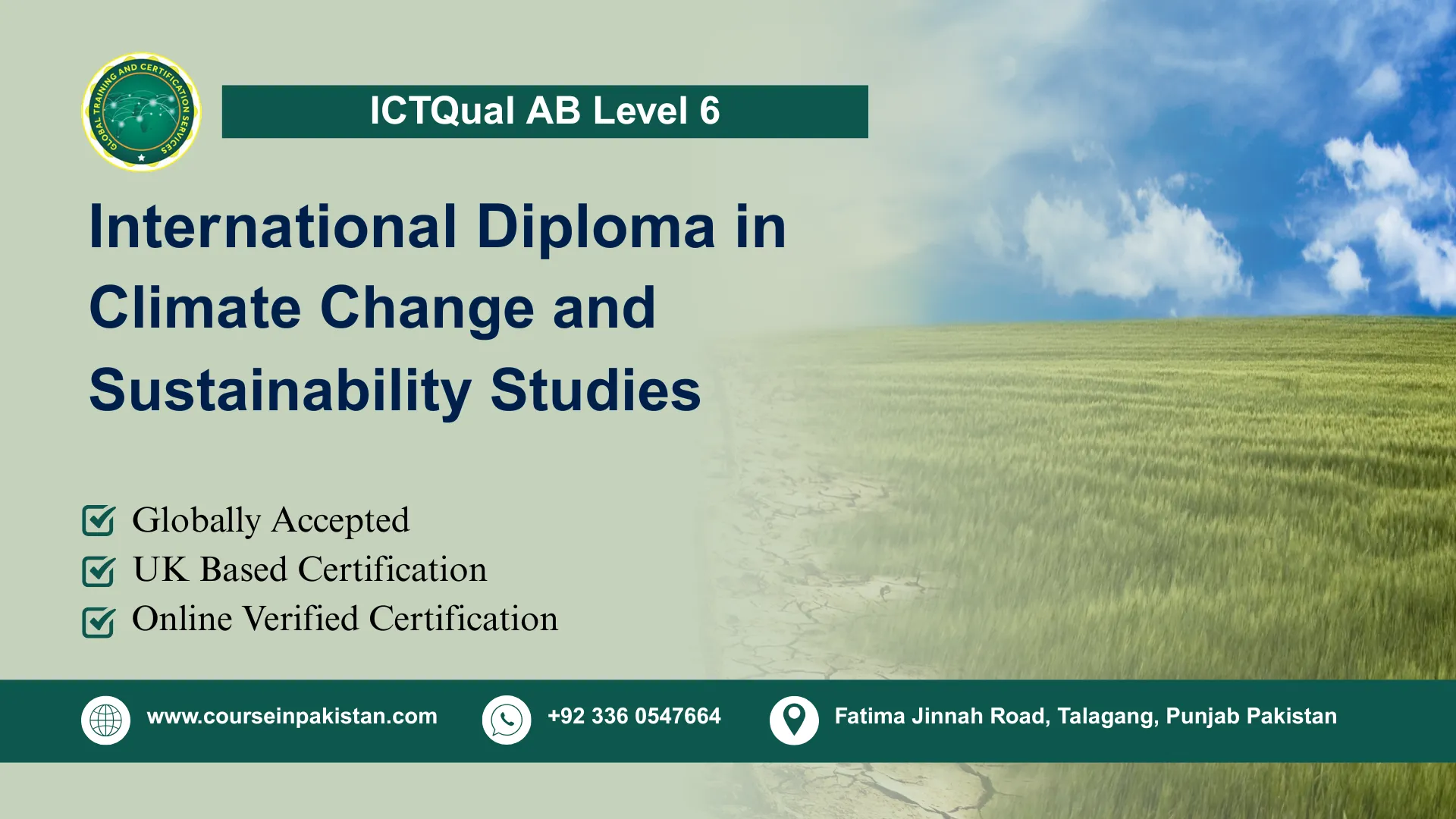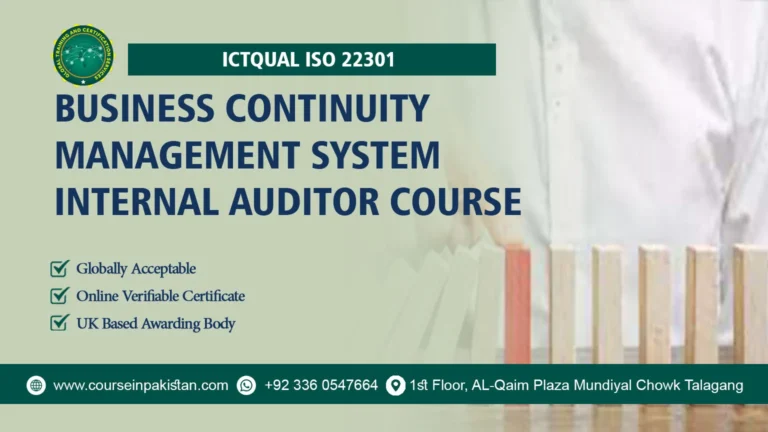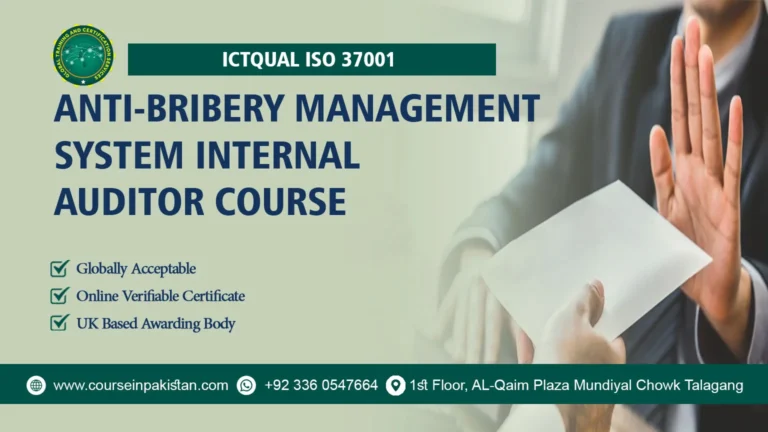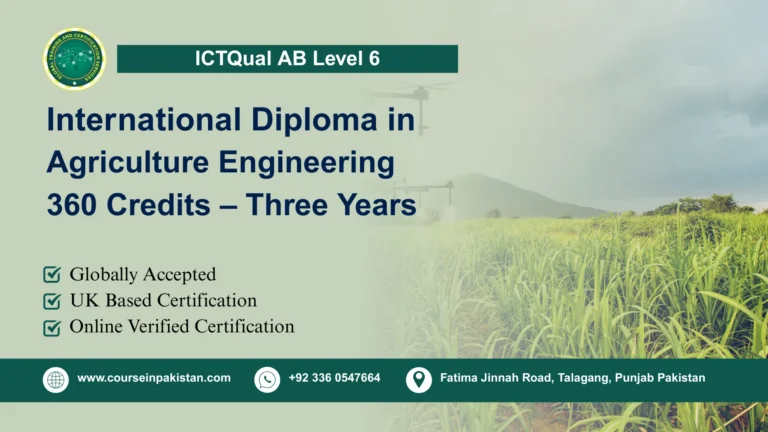
The ICTQual AB Level 6 International Diploma in Climate Change and Sustainability Studies is a globally recognized qualification designed to equip learners with advanced knowledge and practical skills in climate science, environmental sustainability, renewable energy, policy development, and strategic management of environmental challenges. This program provides learners with the expertise to understand global climate issues, develop sustainable solutions, and lead initiatives that promote environmental responsibility and climate resilience.
Learners will explore topics such as climate change mitigation, adaptation strategies, sustainable resource management, environmental policy frameworks, and the integration of sustainable practices in business and community contexts. The course emphasizes practical application alongside theoretical knowledge, enabling learners to address environmental challenges effectively and influence sustainable decision-making in their organizations or communities.
Course Overview
The ICTQual AB Level 6 International Diploma in Climate Change and Sustainability Studies is a comprehensive and globally recognized qualification designed to equip learners with advanced knowledge and practical skills in climate science, sustainability strategies, environmental policy, and renewable energy management. This 360-credit, fully assignment-based diploma allows learners to study at their own pace from anywhere in the world. It is British Council verificable and MOFA and Embassy attestable, making it highly suitable for employment, career advancement, and iqama approval. The program combines theoretical understanding with practical application, preparing learners to develop sustainable solutions and lead climate action initiatives in organizations, communities, and industries.
This qualification is suitable for both fresh learners and experienced professionals. Fresh students are required to complete all 36 mandatory assignments within three years, while experienced and competent individuals with at least six years of relevant experience can complete the certification in a shorter time by submitting verifiable experience and defending their knowledge in professional discussion meetings with an ICTQual AB approved assessor, without completing all mandatory assignments. By the end of the program, learners will have acquired the skills and expertise needed to implement sustainability strategies, influence environmental policy, and take on leadership roles in climate change mitigation, sustainable development, and corporate or governmental sustainability programs.
Key Highlights of the Course:
- Fully 360-credit Level 6 diploma, flexible and self-paced study
- British Council verificable and MOFA/Embassy attestable qualification
- Suitable for fresh learners and experienced professionals with accelerated pathways
- Focus on practical sustainability skills, climate action strategies, and policy development
- Globally recognized for career advancement and iqama approval
Course Benefits
Career Advancement
- Prepare for leadership and managerial roles in sustainability, climate action, and environmental management
- Enhance employability in government agencies, NGOs, corporate sustainability departments, and international organizations
- Gain recognition for expertise in climate change and sustainable development
Professional Recognition
- Obtain a British Council verified and MOFA/Embassy attestable qualification
- Validate professional experience and knowledge for career growth and iqama approval
- Strengthen credibility for international job placements
Flexible Learning
- Complete the diploma entirely through assignments at your own pace
- Accelerated completion option for experienced professionals
- Study from anywhere in the world without strict classroom attendance
Practical Skills Development
- Learn to develop and implement sustainability strategies and climate action plans
- Gain expertise in environmental policy, renewable energy, and sustainable resource management
- Develop problem-solving, leadership, and decision-making skills in sustainability contexts
Academic and Professional Pathways
- Foundation for postgraduate studies in Environmental Science, Climate Change, or Sustainability Leadership
- Access to professional certifications or advanced diplomas in sustainability, renewable energy, or climate policy
- Opportunities to join global professional networks in climate action and sustainable development
Course Study Units
This qualification, theICTQual AB Level 6 International Diploma in Climate Change & Sustainability Studies, consists of 36 mandatory units.
Year 1 – Foundations of Climate Change & Sustainability
- Introduction to Climate Change Science
- Principles of Sustainability and Environmental Management
- Global Environmental Policies and Governance
- Carbon Footprint and Greenhouse Gas Accounting
- Renewable Energy Fundamentals
- Climate Change Impacts and Adaptation Strategies
- Environmental Ethics and Professional Responsibility
- Sustainable Resource Management
- Environmental Monitoring and Data Analysis
- Introduction to Project Planning in Climate Initiatives
- Environmental Communication and Stakeholder Engagement
- Introduction to Risk Assessment in Environmental Management
Year 2 – Applied Climate Change & Sustainability Practices
- Advanced Climate Change Mitigation Strategies
- Sustainable Urban and Industrial Development
- Environmental Impact Assessment (EIA)
- Carbon Management and Trading
- Energy Efficiency and Renewable Integration
- Climate Policy Implementation and Compliance
- Waste Management and Circular Economy Principles
- Environmental Auditing and Reporting Techniques
- Digital Tools and Technologies for Sustainability
- Organisational Behaviour and Sustainability Leadership
- Research Methods in Climate and Sustainability Projects
- Applied Project Planning and Operational Management
Year 3 – Strategic Leadership in Climate Change & Sustainability
- Strategic Sustainability Leadership
- International Climate Agreements and Standards
- Environmental Risk and Crisis Management
- Corporate Social Responsibility (CSR) and Sustainability Strategy
- Sustainable Supply Chain and Resource Management
- Innovation and Emerging Technologies in Sustainability
- Climate Change Policy Development and Implementation
- Environmental Governance and Ethics in Leadership
- Advanced Project Management for Sustainability Initiatives
- Renewable Energy Systems and Integration Strategies
- Independent Research Project in Climate Change & Sustainability
- Capstone Project: Applied Climate Change & Sustainability Studies
Learning Outcomes
Year 1 – Foundations of Climate Change & Sustainability
Introduction to Climate Change Science
- Understand the scientific principles of climate change
- Analyze causes, effects, and global trends
- Evaluate climate data to inform mitigation strategies
Principles of Sustainability and Environmental Management
- Understand key sustainability concepts and frameworks
- Apply environmental management practices in organizations
- Evaluate strategies to balance economic, social, and environmental goals
Global Environmental Policies and Governance
- Understand international environmental policies and conventions
- Apply governance frameworks to local and organizational contexts
- Evaluate the effectiveness of policies in addressing global challenges
Carbon Footprint and Greenhouse Gas Accounting
- Measure and analyze carbon footprints
- Apply greenhouse gas accounting methodologies
- Develop strategies to reduce organizational emissions
Renewable Energy Fundamentals
- Understand renewable energy sources and technologies
- Analyze advantages and limitations of different energy solutions
- Evaluate the role of renewable energy in climate change mitigation
Climate Change Impacts and Adaptation Strategies
- Identify climate change impacts on ecosystems, societies, and economies
- Develop adaptation strategies to enhance resilience
- Evaluate long-term adaptation plans for sustainability
Environmental Ethics and Professional Responsibility
- Understand ethical principles in environmental management
- Apply professional responsibility in sustainability initiatives
- Evaluate ethical dilemmas in climate and sustainability contexts
Sustainable Resource Management
- Manage natural resources efficiently and responsibly
- Apply strategies to optimize resource use and reduce waste
- Evaluate sustainability of resource management practices
Environmental Monitoring and Data Analysis
- Collect and analyze environmental data for decision-making
- Use monitoring tools to track sustainability performance
- Evaluate data to inform policy and operational strategies
Introduction to Project Planning in Climate Initiatives
- Understand project management principles in environmental contexts
- Develop plans for climate and sustainability initiatives
- Evaluate project feasibility and resource requirements
Environmental Communication and Stakeholder Engagement
- Develop effective environmental communication strategies
- Engage stakeholders in sustainability projects
- Evaluate communication effectiveness in promoting climate action
Introduction to Risk Assessment in Environmental Management
- Identify environmental risks and hazards
- Apply risk assessment tools and frameworks
- Develop mitigation strategies to manage environmental risks
Year 2 – Applied Climate Change & Sustainability Practices
Advanced Climate Change Mitigation Strategies
- Develop and implement strategies to reduce greenhouse gas emissions
- Apply mitigation techniques in organizational and community contexts
- Evaluate the effectiveness of mitigation measures
Sustainable Urban and Industrial Development
- Understand principles of sustainable development in urban and industrial contexts
- Apply strategies to reduce environmental impact and enhance resilience
- Evaluate policies and practices for sustainable growth
Environmental Impact Assessment (EIA)
- Conduct environmental impact assessments for projects and policies
- Apply legal and regulatory frameworks in EIAs
- Evaluate assessment outcomes for sustainability compliance
Carbon Management and Trading
- Understand carbon markets and trading mechanisms
- Develop strategies for carbon reduction and offsetting
- Evaluate carbon management policies for organizations
Energy Efficiency and Renewable Integration
- Apply energy efficiency measures in organizations and communities
- Integrate renewable energy solutions into existing systems
- Evaluate energy strategies for sustainability and cost-effectiveness
Climate Policy Implementation and Compliance
- Implement climate policies at organizational or community level
- Ensure compliance with national and international regulations
- Evaluate effectiveness of policy implementation
Waste Management and Circular Economy Principles
- Apply waste management and reduction strategies
- Understand principles of circular economy for sustainability
- Evaluate waste management practices for efficiency and environmental impact
Environmental Auditing and Reporting Techniques
- Conduct environmental audits and assess compliance
- Develop sustainability reports using recognized standards
- Evaluate audit outcomes to improve environmental performance
Digital Tools and Technologies for Sustainability
- Use digital tools to monitor and manage environmental data
- Apply emerging technologies to enhance sustainability initiatives
- Evaluate technology adoption for operational and environmental benefits
Organisational Behaviour and Sustainability Leadership
- Understand organizational culture and behavior in sustainability contexts
- Apply leadership strategies to promote sustainability
- Evaluate organizational change initiatives for climate action
Research Methods in Climate and Sustainability Projects
- Apply qualitative and quantitative research methods
- Analyze environmental data to support sustainability decisions
- Develop evidence-based recommendations for climate initiatives
Applied Project Planning and Operational Management
- Plan and execute sustainability projects effectively
- Apply operational management principles in real-world scenarios
- Evaluate project outcomes for efficiency, impact, and sustainability
Year 3 – Strategic Leadership in Climate Change & Sustainability
Strategic Sustainability Leadership
- Apply leadership principles to guide sustainability initiatives
- Develop strategies to achieve long-term environmental goals
- Evaluate leadership effectiveness in sustainability programs
International Climate Agreements and Standards
- Understand international climate agreements and standards
- Apply global frameworks in organizational and policy contexts
- Evaluate compliance and effectiveness of international climate strategies
Environmental Risk and Crisis Management
- Identify environmental risks and develop crisis management strategies
- Apply risk mitigation and emergency response frameworks
- Evaluate organizational resilience in environmental crises
Corporate Social Responsibility (CSR) and Sustainability Strategy
- Develop CSR strategies aligned with sustainability objectives
- Apply sustainability strategies in corporate contexts
- Evaluate CSR programs for environmental and social impact
Sustainable Supply Chain and Resource Management
- Implement sustainable practices across supply chains
- Optimize resource use while minimizing environmental impact
- Evaluate sustainability performance across supply chain operations
Innovation and Emerging Technologies in Sustainability
- Identify innovative solutions for environmental challenges
- Apply emerging technologies to enhance sustainability performance
- Evaluate technological adoption for scalability and impact
Climate Change Policy Development and Implementation
- Develop and implement effective climate policies
- Ensure alignment with national and international frameworks
- Evaluate policy impact on sustainability outcomes
Environmental Governance and Ethics in Leadership
- Apply governance and ethical principles in sustainability initiatives
- Promote accountability and transparency in environmental leadership
- Evaluate governance frameworks for effectiveness and compliance
Advanced Project Management for Sustainability Initiatives
- Plan, execute, and manage complex sustainability projects
- Apply project management tools to environmental programs
- Evaluate project success in terms of impact, cost, and sustainability
Renewable Energy Systems and Integration Strategies
- Understand advanced renewable energy systems and technologies
- Integrate renewable energy into organizational or community projects
- Evaluate energy integration strategies for sustainability and efficiency
Independent Research Project in Climate Change & Sustainability
- Conduct independent research on a relevant sustainability topic
- Apply research methods to analyze environmental challenges
- Present findings and recommendations for practical application
Capstone Project: Applied Climate Change & Sustainability Studies
- Integrate knowledge and skills from the entire program into a practical project
- Develop and implement a comprehensive sustainability or climate initiative
- Demonstrate competence in strategic planning, project management, and leadership
Who is This Course For?
Aspiring Environmental Professionals
- Individuals seeking to start a career in climate change, sustainability, or environmental management
- Fresh graduates aiming to gain a globally recognized qualification in climate science and sustainability
Experienced Practitioners
- Professionals working in environmental, energy, corporate sustainability, or government sectors
- Individuals looking to enhance strategic leadership, policy implementation, and operational management skills in sustainability
Independent and Self-Motivated Learners
- Learners who prefer a flexible, self-paced, assignment-based study approach
- Individuals capable of completing assessments remotely from anywhere in the world
Future Leaders and Strategists
- Learners aspiring to senior management or executive roles in sustainability, climate action, or environmental projects
- Professionals aiming to lead sustainability initiatives, corporate social responsibility (CSR) programs, or climate mitigation strategies
Globally Oriented Professionals
- Individuals seeking a qualification verified by the British Council and attestable by MOFA/Embassy
- Professionals targeting iqama approval or international career opportunities in environmental and sustainability sectors
Future Progression
- Leadership and senior management roles in climate change, sustainability, and environmental management
- Strategic positions in government agencies, NGOs, corporate sustainability, and international organizations
- Consultancy opportunities in climate policy, renewable energy, and sustainable development
- Opportunities to lead research, training, and implementation of sustainability initiatives
Academic Pathways:
- Progression to postgraduate studies in Climate Change, Environmental Science, or Sustainability Leadership
- Advanced professional certifications or diplomas in renewable energy, environmental policy, or sustainability management
- Specialization programs in climate adaptation, green technologies, or sustainability management
- Access to professional networks and training programs for continued career growth in sustainability
Conclusion
The ICTQual AB Level 6 International Diploma in Climate Change & Sustainability Studies is a flexible, globally recognized qualification designed for both fresh learners and experienced professionals. With 36 mandatory units and 360 credits, the course develops advanced knowledge and practical skills in climate science, sustainability strategies, environmental policy, and renewable energy integration. Fresh learners complete all assignments within three years, while experienced professionals with relevant experience can complete the program in a shorter time through professional discussion assessments.






